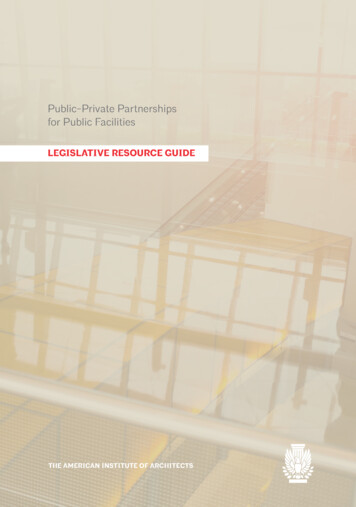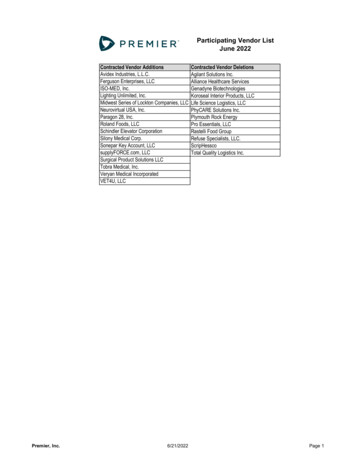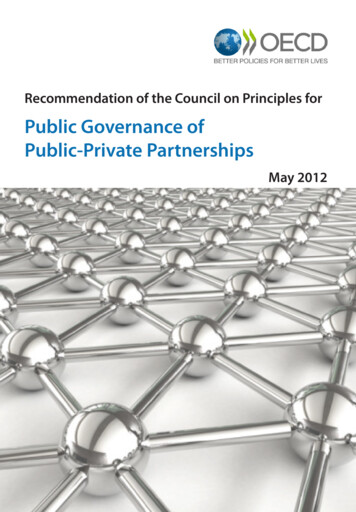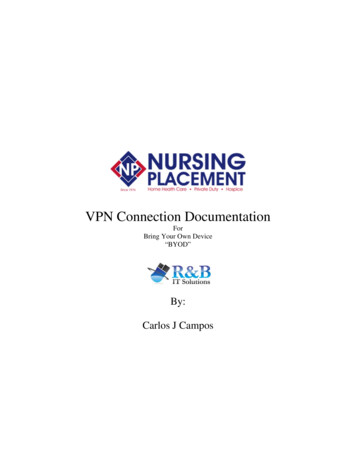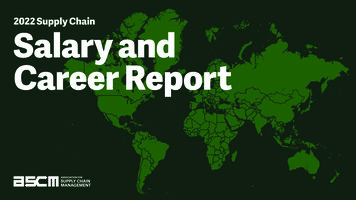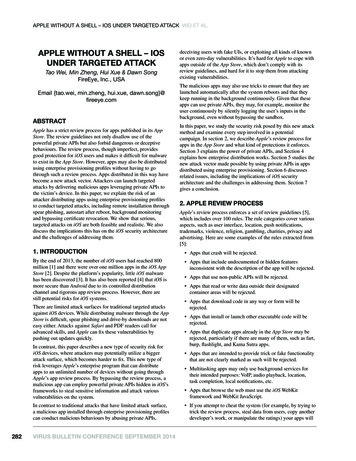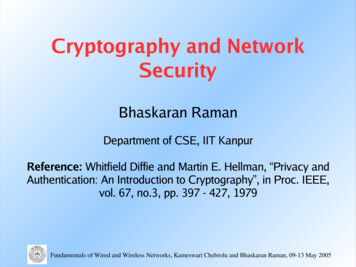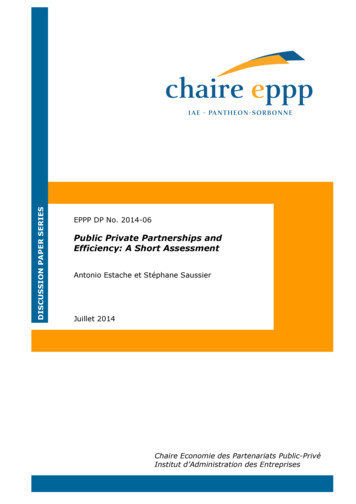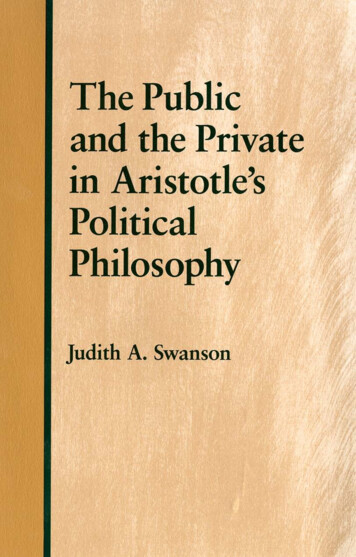
Transcription
THE PUBLIC AND THE PRIVATEIN ARISTOTLE' SPOLITICAL PHILOSOPHY
The PUBLICand the PRIVATEin ARISTOTLE'SPOLITICAL PHILOSOPHYJudith A. SwansonC O R N E L L UN IVE RSITY PRESSIthaca and London
Open access edition funded by the National Endowment for theHumanities/Andrew W. Mellon Foundation Humanities Open BookProgram.Copyright 1992 by Cornell UniversityFirst printing, Cornell Paperbacks, 1994Second paperback printing 2019The text of this book is licensed under a Creative CommonsAttribution-NonCommercial-NoDerivatives 4.0 InternationalLicense: .To use this book, or parts of this book, in any way not covered bythe license, please contact Cornell University Press, Sage House,512 East State Street, Ithaca, New York 14850. Visit our website atcornellpress.cornell.edu.Printed in the United States of AmericaISBN 978-0-8014-2319-2 (cloth: alk. paper)ISBN 978-1-5017-4082-4 (pbk.: alk. paper)ISBN 978-1-5017-4083-1 (pdf)ISBN 978-1-5017-4084-8 (epub/mobi)Librarians: A CIP catalog record for this book is available from theLibrary of Congress
To D R M
C O NTE NTSAcknowledgmentsA Note on Translations and TextsIntroduction123xixiii19The Household : A Private Source of Public MoralityOn the Relation between the Household and the City11The Household's Contribution to Virtue16The Means to Virtue: Rule17The Aim of Household Rule: Virtuous Individuals18Teaching Moderation19Teaching Judgment21Affection25Friendship and Justice in the Household2731Mastery and SlaverySlavery: A Nonpublic, Domestic Practice32Natural Slaves, Animals, and the Slavish33The Master-Slave Relationship36The Natural and Private Status of Slavery4144Women, the Public, and the PrivateThe Female: A Biologically Inferior Being?45The Household: A Woman's Domain52A Pairing Being: A W ife52An Ethical Being: A Household Manager55vii
viiiCON T E N TSAn Educated Being: A Parent?4557A Speaking Being: A Citizen?59An Intellectual Being: A Philosopher?61Feminist Claims Revisited6569The Economy: A Public Place for Private ActivityRival Interpretations70Aristotle and Classical Economics75The Best Economy77The Second-Best Economy89On the Relation between Politics and Economics9295Preservative Law: Ordering the RegimePreserving the Private95The Rule of Law versus the Rule of Men97The Rule of Law98Aristotle's Argument against Changing PatrioiNomoiSoft Laws: Marital, Health, and Population Laws102106Laws to Prevent Domestic Conflict: Economicand PenalLaws Concerning War6110115Religious Laws117Political Laws: Offices and Entitlement1191 32Political Education: A Preface to JusticePolitical Virtue: Virtue Redefined133The Guiding Principles of Political Education:"The Possible and the Proper"144The Means of Political Education:Habit and Reason7147Education by Habituation148Leisure: Education in Reason?155Leisure: Private and Public Good160Private Friends and Public CitizensFriendship Defined165165Kinship167Friendships of Utility169Friendships of Pleasure171Self-Love: Public and Private Friendship173
Contents8True Friendship174Alternative Conceptions of Political Friendship180Concord: Friendship among Citizens184Rule: Friendship between Rulers and Ruled187Philosophy: Reciprocity between the Most Privateand the PublicIntellectual Virtue and Contemplation193193The Relation between Moral and Intellectual Virtue198Philosophical es of InterpretationThe Composition of the PoliticsBibliographyWorks by AristotleSelected Secondary WorksIndexix212221227227228235
ACK N O WL E D G M E NTSMost helpful in the production of this book were the commentsprovided by the then anonymous readers selected by Cornell Uni versity Press. Thomas L. Pangle's remarks compelled me to revisesome of my arguments. David R. Lachterman suggested that Irespond to several particular interpretations; as a result the bookaddresses issues it might not have otherwise . I am grateful to bothfor their suggestions . A first, very different draft was read byJoseph Cropsey, who also read a late draft of the Introduction; byNathan Tarcov and Russell Hardin; and by Ian Shapiro, who alsoread a subsequent version of Chapter 4. Mary P. Nichols gaveuseful comments on a draft of Chapter 2. Research assistance wasprovided by Michael Jones, Susanne Klepper, and Lisa Toland . Forintroducing me to political philosophy, I acknowledge in particularTimothy Fuller, the late Michael Oakeshott, and Joseph Cropsey.An Earhart Foundation Fellowship and a Josephine de KarmanFellowship from the Aerojet-General Corporation enabled me tobegin the manuscript that evolved into this book; a lectureship inthe Department of Political Science, Yale University, enabled me towrite a draft; teaching seminars on Aristotle at Yale, the Universityof Georgia, and Boston University gave opportunity for reflection;a Boston University Faculty Research Grant helped me to completethe book. Except for the arguments I explicitly credit to others, theinterpretation is my own .J. A. S .xi
A N OTE O N TR A N S L ATI O N SA N D TE XTSI have translated portions of Aristotle's Politics from the text edit ed by Alois Dreizehnter, consulting the translations of Ernest Bar ker, Carnes Lord, W. L . Newman, and H. Rackham . In translatingfrom the Nicomachean Ethics I used the text edited by FranciscusSusemihl and consulted the translations of Terence Irwin, H. Rack ham, and W. D . Ross. My translations of Aristotle's other workswere generally from the texts provided by the Loeb editions; Iconsulted the Loeb translations and those of the Clarendon Aristo tle Serie s . For full and specific references, see the Bibliography.Any emphasis in quotations of Aristotle is mine . Quotations ofPlato's Republic and the Laws are from Allan Bloom's translation(New York: Basic Books, 1 968) and Thomas L. Pangle's translation(New York: Basic Books, 1 980), respectively. Translations of com mentary in French are my own . The quotation from Joachim Rit ter's Metaphysik u n d Politik in the Appendix, "Premises of In terpretation," was translated with help from a Berlitz LanguageCenter.I use the following abbreviations for Aristotle's works:ACDAEEGAHAMetThe Athenian ConstitutionOn the Soul (De Anima)Eudemian EthicsGeneration of AnimalsHistoria AnimaliumMetaphysicsxiii
xivMMNEOecPAPhPolRhTopTRA NSL A TrO NS A N D TEXTSMagna MoraliaNicomachean EthicsOeconomicaParts of AnimalsPhysicsPoliticsThe "Art" of RhetoricTopicsReferences to Aristotle's texts are to the Bekker line numbers asfound in Dreizehnter's edition of the Politics, Susemihl's edition ofthe Nicomachean Ethics, and the Loeb editions of other works . I alsorefer to the chapter and section divisions found in the same edi tion s . References appear in order of importance; clusters of refer ences are intended to be considered together (though some num bers may refer to the same point).
THE PUBLIC AND THE PRIVATEIN ARISTOTLE' SPOLITICAL PHILOSOPHY
I NTR O DUCTI O NThe central topic of this book is the meaning of privacy accordingto Aristotle . I propose that Aristotle's political works present avivid and substantive conception of the private . It is widely be lieved, though, that political philosophy did not take an interest inprivacy until the emergence of classical liberalism in the seven teenth century. Most interpretations of Aristotle's political philoso phy in particular indicate that he regards the private only as aprecondition to the public; commentators argue or assume that heequates the private with the household . 1 What accounts for thesemisreadings? Two possible sources are Aristotle's usage of theword idios and classical liberalism . The word idios, "private" or"one's own," usually means in Aristotle's corpus simply what isnot common, public, or relative to the regime . 2 From this meaningone might infer that Aristotle treats the private only in contradis tinction to the public . 3 Modern expositors may infer that Aristotle1 For a famous example, see Hannah Arendt, The Human Condition (Chicago:University of Chicago Press, 1 958), 37.2 H . Bonitz, Index Aristoteiicus, 2d ed. (Graz: Akademische Druck-U. Verlag sanstalt, 1955), 339 . Thus, bios idios is a way of life that is not "the common way oflife of the city [koinon tes poleos]" or is not politically active (ouk ekoinonesan praxeonpolitikon) (Pol 1 265a26, 1273b27-29).3 It is also inaccurate to suggest, a s Arendt does, that Aristotle ( "the Greeks")thought privacy idiotic, presumably because one meaning of idiotes is "ignoramus"(Human Condition, 38). It should be noted now, since I make several references toHuman Condition, that Arendt does not always make clear whether she means toinclude Aristotle among "the Greeks" and "the ancients" (by which she seemsto mean the Greeks and the early Romans); and at times, especially in her second1
2T H E P U B L I C A N D T H E PRI V A T Eequates the private with the household because they are familiarwith the liberal tradition's formulation of the private as a "sphere ."In any case, Aristotle's conception of the private includes both thehousehold and the meaning of idios, but it goes beyond both; forthe private is constituted of activities that cultivate virtue and dis count common opinion.It is not that Aristotle never characterizes places as private;rather, in his estimation what defines a site as private are theactivities that ordinarily go on within it. If the activities promotevirtue un compromised by prevailing morality, then the place isprivate . Similarly, the number of persons involved in an activitydoes not in itself determine whether it is public or private . Forexample, a multitude of people can transact business with .oneanother. Number of agents is a determining feature of private ac tivity only if the quality of the activity suffers when more than alimited number participate .Because Aristotle maintains that virtuous activity may requireagents to make choices and that actualizing virtue may even meanright choice making, he understands the private to include theopportunity and the resources needed to make virtuous choices, orprivacy. Insofar as privacy is opportunity to actualize virtue, itpresents opportunity not to act virtuously or at least not to actu alize one's potential. This sense of the private, the private con ceived in terms of choice, comes closest to the modern notion. As Ishow in Chapter 4, this is the respect in which Aristotle under stands economic activity to be private .Whether actualized or not, every form of private activity has,Aristotle suggests, a telos of its own . Raising children, interactingchapter, she conflates Homer's, Plato's, and Aristotle's views. She approaches justify ing her presentation when she claims that Plato and Aristotle sometimes expresspublic opinion. She asserts, for example, that "in his two most famous definitions [ofman as a political and a speaking animal), Aristotle only formulated the currentopinion of the polis about man and the political way of life ." And later, "these aspectsof the teachings of the Socratic school . . . sprang not from actual experience inpolitical life . . . . But the background of actual political experience, at least in Platoand Aristotle, remained so strong that the distinction between the spheres of thehousehold and political life was never doubted" (Human Condition, 27, 37). I generallyrefer only to Arendt's commentary that is explicitly on Aristotle; but because sheembeds her commentary on Aristotle in her commentary on "the Greeks" and "theancients" and sometimes treats Aristotle's thought as representative of "the Greeks,"I occasionally regard her remarks on "the Greeks" as including Aristotle. For discus sion of the general question of the relation between Aristotle's work and his culture,see the Appendix, "Premises of Interpretation ."
Introduction3with one's mate, overseeing servants, transacting business, keep ing friends, and philosophizing all require virtue of some kind,and each activity can be perfected . By trying to perfect such ac tivities, human beings realize their own potentials . Achieving vir tue requires discounting or being insulated from common, dilutedconceptions and misconceptions of virtue . To live only according toprevailing expectations precludes discovery of one's potential . ForAristotle, the raison d' etre of privacy is to enable one to turn awayin order to achieve excellence .This point raises the second topic of this book: the relation be tween the public and the private . Traditional accounts of Aristotle'spolitical philosophy, especially Hannah Arendt's, maintain that heexalts the public realm over the private-a view usually derivedfrom the assumption that he equates the private with the house hold and the household with the realm of necessity. On this view,Aristotle believes that the private opposes the public as necessityopposes freedom . 4I n this book I dispute that interpretation . Insofar a s Aristotleindicates that private activity requires pulling away from the dragof common opinion, he presents the private in opposition to thepublic . But insofar as he suggests that private activity in the formof, say, friendship or philosophy can transform common opinioninto right opinion, he believes that the private serves the public .His account suggests, moreover, that human beings carry virtueearned in private into the public, whereas the human propensity tocherish what is one's own and desirable (Pol 1262b22-23) protectsthe private from being corrupted by opinions learned in public .The public should accommodate and if possible facilitate the pri vate, according to Aristotle . By way of law, ruling, and education,the public should provide opportunities and resources to cultivatevirtue . By facilitating the forming of families, for example, a regimeencourages kinship, a kind of friendship and moral virtue; by al lowing a free market, it invites citizens to cultivate judgment andself-restraint; and by furnishing a liberal arts education, it pro motes moral and intellectual virtue . 5 Private endeavor repays theArendt, Human Condition, 27.5 See also Richard Mulgan, "Aristotle and Political Participation," Political Theory18, no. 2 (1990), 198. Although I agree with Mulgan that Aristotle thinks the privateshould be "a concern of the community and its laws," I maintain that Aristotlewants regimes to keep in view the difference between interfering in and facilitatingthe private .4
4T H E P U B L I C A N D T H E PRI V A T Epublic: families provide future citizens, the economy effects dis tribution, and the educated are able to rule and teach . A regimeshould aim to bring about such a dynamic equilibrium between thepublic and the private, for then it will be self-sufficient, "what isbest" (Pol 1253al).Why should members of contemporary liberal societies take noteof Aristotle's recommendations regarding the public and the pri vate? Perhaps because the liberal conception of the private and ofits relation to the public is wanting. The distinctively modern liber al view of privacy arguably derives from Hobbes and Locke inparticular. 6 Hobbes contributes to the modern view of privacy inarguing that nature, by both imposing on human beings and ar ranging no escape from the desire for self-preservation, sanctionsone's resistance to threats:If the sovereign command a man, though justly condemned, tokill, wound, or maim himself; or not to resist those that assaulthim; or to abstain from the use of food, air, medicine, or any otherthing, without which he cannot live; y et hath that man the libertyto disobey.If a man be interrogated by the sovereign, or his authority,concerning a crime done by himself, he is not bound, withoutassurance of pardon, to confess it.?Nature figuratively shields each individual with the right to self protection . Shielded by this right, each individual inhabits a "pri vate world" -necessarily distinct from the worlds of others in thatits raison d' etre is that individual's security. 8Because self-defense cannot reliably ward off threats to self-pres ervation, Locke observes that individuals need a legal "fence" toprohibit all threats, including any from the ruling power. Locke notonly seals the sphere around each individual (by replacing natural6 Hobbes's political theory, though not itself liberal, was instrumental in the riseof liberalism; see Andrzej Rapaczynski, Nature and Politics: Liberalism in the Philoso phies of Hobbes, Locke, and Rousseau (Ithaca: Cornell University Press, 1987), 1 1 - 12,25-29, 63-65 .7 Thomas Hobbes, Leviathan or the Matter, Forme and Power of a CommonwealthEcclesiasticall and Civil, ed. Michael Oakeshott (Oxford: Basil Blackwell, 1946),XXI . 142; see also XIV.B4, and Rapaczynski, Nature and Politics, 49, 75-76, 83 .8 Rapaczynski, Nature and Politics, 76-77.
Introduction5right with the rule of law) but, through his theory of labor, enlargesit. Each person's fence- the law as it applies to that person-en closes not simply his life but also whatever "he hath mixed hislabour with. "9From both Hobbes and Locke then emerges the conception ofprivacy as a sphere . 'This view . . . of a private sphere surround ing [man] that cannot be entered (first by other individuals andeventually by the state) without his consent, became the standardview of freedom in the liberal tradition . " I O Indeed, one finds evenin J. S. Mill's account of liberty the notion of "self-regarding"spheres, dictated not by natural but by constituted rights derivedfrom the greatest happiness principle . l 1 And some contemporarytheorists following in the liberal tradition conceive privacy as asphere . 12Because a sphere takes up space, it must compete with whateverelse takes up space-the state, or public sphere . In the liberalaccount, what is not private is that which intrudes . The effect of theimagery is to pit the private and the public against one another. 13Aristotle would point out that the imagery works against the aim ofliberalism insofar as it suggests that the private cannot expandwithout cost to the public. He would also say that liberalism com pounds this general and abstract difficulty by encouraging morallyinadequate conduct in each sphere . Hobbes, for example, allowssubjects to do anything not forbidden by the sovereign. Thiswould not seem so radical were it not for Hobbes's belief thathuman beings are fundamentally irrational, keeping obligationsonly out of fear of human or divine retribution for breaking them . 149 John Locke, Second Treatise of Government, ed. C. B. Macpherson (Indianapolis:Hackett, 1980), sees . 17, 27, 93, 1 23-24, 137-38, 171; see also Rapaczynski, Natureand Politics, 189.1 0 Ian Shapiro, The Evolu tion of Rights in Liberal Theory (Cambridge: CambridgeUniversity Press, 1 986), 277; see also 278.11 John Stuart Mill, On Liberty, ed. Gertrude Himmelfarb (New York: Penguin,1982), 1 5 1 , 141, and Mill, Utilitarianism, with Critical Essays, ed. Samuel Gorovitz(Indianapolis: Bobbs-Merrill, 1971), 18.12 For example, Robert Nozick, Anarchy, State, and Utopia (New York: Basic Books,1974), and John Rawls, A Theory of Justice (Cambridge: Harvard University Press,1971). See also Shapiro, Rights, 278-79 .1 3 Thus, Arendt's account of Aristotle's political philosophy reflects the influenceof the liberal tradition; see again, Human Condition, 27, for example.1 4 Leviathan , XXVl. 1 74. On insatiable desires, see Rapaczynski, Nature and Politics,32, 34, 42, 64; on keeping obligations, see 23 n. 15, 72-75, 88-90, 99, 1 04-5 . I findRapaczynski's positivist interpretation of Hobbes more persuasive than the pruden tialist one .
6T H E P U B L I C A N D T H E PRI V A T EFurthermore, Hobbes allows the sovereign to forbid anything including what Aristotle would consider virtuous-either ex pressly or by imprinting on the "clean paper" of "commonpeople's minds" whatsoever he deems necessary or beneficial tothe security of the state . IS The moral conduct of subj ects, derivingfrom their own or the sovereign's will, must then be either arbi trary or in accordance with necessity.Locke, in contrast, gives the responsibility of defining moralitynot to the sovereign or to the individual but to the maj ority. Heappears to give this responsibility to the individual in indicatingthat moral conduct derives from a dialectic between the indi vidual's reason and practical sense experience . The moral prin ciples to which this dialectic gives rise are, however, those thatmost rational agents find acceptable . Locke differs from Kant, then,in allowing reason (in the service of morality) to accommodatenatural preference s . But he differs from Aristotle in allowing rea son to accommodate "normal" preferences . I6Locke says, in effect, that the standards of the private shouldderive from the public . He opens the private to corruption by themultitude . Aristotle argues, in contrast, that the standards of theprivate should emanate from wisdom, an attribute of few. Wisdomis not denaturalized Kantian reason but knowledge that dis tinguishes between natural preferences that are consistent withliving nobly and those that are not. For Aristotle, then, privacydoes not permit ordinary vices but requires extraordinary virtue s .It does n o t sanction a right t o do a s o n e pleases or even mandatemorally acceptable conduct (what is appropriate in public) buturges doing as one ought . I 7 In sum, in Aristotle's view human15Leviathan , XXX . 221; see also XVIII . 1 l 6- 1 7, XXV1 . l 74, XLVl . 446 .Aristotle would commend Locke for naturalizing rationality but would findthat he overcompensates for the inadequacy of Kant's theory in leaving morality tothe rational capacities and life experiences of the majority. This abbreviated accountof Lockean morality and the comparison between Locke and Kant derive fromRapaczynski, Nature and Politics, 156-76, especially 1 66-67, 1 70 .1 7 John Gray, in Liberalism (Minneapolis: University o f MinnesotaPress, 1986), 4,correctly finds in Aristotle a duty-based conception of natural right insofar as Aris totle connects virtue with choice making . But Gray maintains that this connectionintimates a "rudimentary . . . conception of natural human rights," which is prob lematic. For, as Gray notes, these allegedly intimated rights are "very unequal" (tocall them h u man rights is then misleading). Accordingly, "they coexist uneasily withAristotle's . . . defence of natural slavery." In addition, they do not generate "aright to noninterference," because (as Gray does not note) not all virtue results fromchoice making (NE 1 l 03a17, 1 l 06all -12, 1 139a33-34, 1 157b6-7, 31). If we under16
Introduction7beings should conceive privacy not as a sphere that should (at best)accommodate common opinion but as activities that cultivate vir tue and discount common opinion .But what are the aspects of Aristotle's view of the private thatmake it worthy of consideration by contemporary liberal societies?First, the private is as important to Aristotle as it is to liberalthinkers . Aristotle agrees that the maintenance of the private isessential to the self-sufficiency and happiness of the individual andof the body politic . Accordingly, he would endorse the merging ofliberal theory and classical economics . Second, Aristotle's concep tion of the private as harboring excellence justifies the public sec tor's expansion of the private, fostering the aims of liberalism.Third, privacy on Aristotle's account includes the freedom not toparticipate in political life which many liberal theories protect . In deed, arguing that the best regime is an aristocracy, Aristotle advo cates the political participation of, where possible, only the vir tuous, whose numbers are normally small . 1 8 He would disagree,then, with communitarian critics who think that liberalism over emphasizes the private as such, encouraging preoccupation withthe self and discouraging public-spiritedness. 19 Fourth, Aristotle'sconception of the private allows for "limited moral pluralism," asdoes classical liberalism: 20 "To each man the activity in accordancewith his own disposition is most choiceworthy" (NE 1 1 76b26-27).Again, only the nature of the limits differ. Finally, Aristotle indi cates that incorporating privacy into political society depends lessstand Aristotle's advocacy of independent, virtuous choice making not as "someconception of natural human rights" but as a part of his conception of privacy, thenthese difficulties disappear; in Aristotle's view, every human being has a right toprivacy insofar as everyone-from childre,n to the slavish to the philosophical should be granted (by those who rule them) opportunities to cultivate the mostvirtue of which they are capable. But this right may sometimes require denyingsome persons (for example, children, law breakers) freedom to make choices, or itmay circumscribe their choices; and it does not grant the eligible merely the freedomto choose, but also the resources and thus the encouragement or direction to choosevirtuously.18 At least one scholar argues that Aristotle endorses monarchy even over aris tocracy; see P. A. Vander Waerdt, "Kingship and Philosophy in Aristotle's BestRegime," Phronesis 30, no. 3 ( 1985), 249-73 .1 9 Aristotle would thus be surprised to find some of these critics invoking him intheir critiques of liberalism; see, for example, William A. Galston, Justice and theHuman Good (Chicago: University of Chicago Press, 1980), and Alasdair MacIntyre,After Virtue: A Study in Moral Theory (Notre Dame: University of Notre Dame Press,1981).2 0 See Shapiro, Rights, 275-76.
8THE PUBLIC AND THE PRIVATEon political than o n individual initiative, and s o his political philos ophy provides fewer political directives than insights into how tolive . For all these reasons, liberal societies should find Aristotle'sconception of the private eligible .In sum, by way of its understanding of the public and the pri vate, Aristotle's political philosophy indirectly illuminates theshortcomings of liberalism and provides insights into how liberalsocieties might mitigate or rectify their deficiencies . By assimilatingAristotle's teaching about the public and the private, in particularabout the centrality of excellence to private activity, a liberal societycan transform itself into a form of polity that promotes true free dom and approaches true aristocracy.
1THE H O US E H O L D:A P R IV ATE S O U RCEO F PU B L IC M O R A L ITYAccording to a widely accepted interpretation, one promotedunreservedly by Hannah Arendt, Aristotle depicts the private inthe following ways: ( 1 ) as distinct and separate from the public; (2)as corresponding to the household; (3) as serving only individualand species survival; and, most notably, (4) as justifying "force andviolence . . . because they are the only means to master necessi ty-for instance, by ruling over slaves . " On this interpretation,Aristotle reveals "tremendous contempt" for the private by depict ing it as a dark, despotic, and subhuman sphere in which freedomdoes not exist. "In ancient feeling the privative trait of privacy,indicated in the word itself, was all-important; it meant literally astate of being deprived of something, and even of the highest andmost human of man's capacitie s . " lIt follows i n this widespread interpretation that Aristotle thinksthat a "truly human" life awaits in the public sphere . One mustearn this life by mustering the courage to leave the sheltered andpredictable (if wretched) household . 2 One needs courage also toparticipate in the unpredictable world outside the household : thespeeches, deeds, and political affairs of men . Moreover, in chal lenging men to initiate speech and action, the political realm calls1 Hannah Arendt, The Hllman Condition (Chicago: University of Chicago Press,1958), 24-38, 45-46, 71 -84 . Arendt thus implies without resolving that the privateon this account is both opposed to and the condition for freedom (see especially 27,30-31).2 Arendt tries in this way to address the difficulty her interpretation creates : if thehousehold is a miserable place, then why does it take courage to leave it?9
10T H E P U B L I C A N D T H E PRI V A T Eo n each lito distinguish himself from all others, to show throughunique deeds or achievements that he was the best of all (aienaristeuein)." Freedom lies exclusively in the political realm becauseonly through political speech and action can one excel and revealone's individuality. On this account, Aristotle connects freedomwith excellence and excellence with individuality, and he specifiesagonistic political action as the means to all thre e . Accordingly,Arendt claims, lithe 'good life,' as Aristotle called the life of thecitizen, therefore was not merely better, more carefree or noblerthan ordinary life, but of an altogether different quality."3As I noted in the Introduction, I contest the view that Aristotleequates the private with the household . I argue that he conceivesthe private as activities, not as sites, and as activities not restrictedto the household . An activity qualifies as private, if it cultivatesvirtue without accommodating or conforming to common opinion .Because in Aristotle's view the household can and should containprivate activities, my interpretation acknowledges that he regardsthe household as a private place; that is, the private status of thehousehold derives from its affording an opportunity to practiceunqualified virtue . 4In the first three chapters of this book I consider the activities(and, to illuminate them, their agents) that Aristotle believes thehousehold should contain and contest Arendt's interpretation ofAristotle's notion of the household . I do not dispute that Aristotlethinks the purpose of the household is to meet basic needs andfoster the survival of the species, but I do dispute that he thinksfulfillment of this purpose requires
2 Mastery and Slavery 31 Slavery: A Nonpublic, Domestic Practice 32 Natural Slaves, Animals, and the Slavish 33 The Master-Slave Relationship 36 The Natural and Private Status of Slavery 41 3 Women, the Public, and the Private 44 The Female: A Biologically Inferior Being? 45 The Household: A Woman's Domain 52




